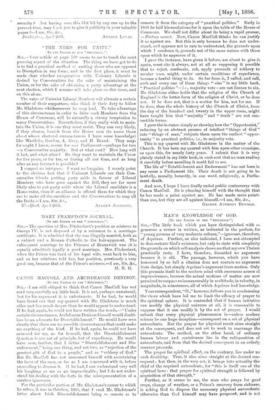CANON MACCOLL AND ARCHDEACON DENISON.
[TO THE EDITOR OF THE "SPECTATOR."] Sus,--I am still obliged to think that Canon MacColl has not read very carefully my little book. It is not, perhaps, unnatural; but for his argument it is unfortunate. If he had, he would have found out that my quarrel with Mr. Gladstone is much older and lies much deeper than he would appear to understand. If he had, again, he could not have written the words,ŌĆö" Under certain circumstances, Archdeacon Denison himself would doubt- less ba an advocate for Disestablishment." He would have seen clearly that there are no possible circumstances that could make me anything of the kind. If he had, again, he could not have assumed for me, as for himself, that the Disestablishment Question is one not of principle, but of expediency. He would have seen, further, that I define " Disestablishment and Dis- endowment," being one thing, and not two, as "rejection of the greatest gift of God to a people," and as " robbery of God." But Mr. MacColl has not concerned himself with ascertaining the facts of the case, so far as I am concerned with it, before proceeding to discuss it. If he had, I can understand very well his laughing at me as an impracticable ; but I do not under- stand his dealing with the facts in the misrepresentation of a careless ignorance.
For the particular portion of Mr. Gladstone's career to which he refers, it was in October, 1865, that I read Mr. Gladstone's letter about Irish Disestablishment being so remote as to
remove it from the category of " practical politics." Early in 1868 he laid his resolutions for it upon the table of the House of Commons. We shall not differ about its being a rapid process,. ŌĆö Factunt manet. Now, Canon MacColl thinks he can justify it as against me. But this is only because he does not under- stand, and appears not to care to understand, the grounds upon which I condemn it, grounds not of the same nature with those upon which he approves of it.
I gave the instance, have given it before, am about to give it again, must cite it always, not at all as supposing it possible that to reject, confiscate, rob, apply proceeds of robbery to secular uses, might, under certain conditions of expedience, become a lawful thing to do. So far from it, I called, and call, each and every one of these things " sins " in my little book. " Practical politics "ŌĆöi.e., majority voteŌĆöare not licence to sin. Mr. Gladstone either holds that the religion of the Church of England is the better form of the religion of Christ, or he does not. If he does not, that is a matter for him, not for me. If he does, then the whole history of the Church of Christ, from the day of the hundred and twenty in the upper room, might have taught him that "majority " and " truth" are not con- vertible terms.
I gave the instance simply as showing how the "Opportunist,'' reducing by an abstract process of intellect "things of God" into "things of man," subjects them upon the earliest "oppor- tunity " to practical politics, i.e., to majority vote.
This is my quarrel with Mr. Gladstone in the matter of the Church. It has been my quarrel with him upon other occasiopts, as upon this, for nearly forty years. I submit that it is very plainly stated in my little book, in such sort that no man reading it carefully before assailing it could fail to see.
The life of "Establishment and Endowment" has not been in any sense a Parliament life. Their death is not going to be lawfully, morally, honestly, in one word, religiously, a Parlia- ment death.
And now, I hope I have finally ended public controversy with Canon MacColl. He is pleasing himself with the thought that he has made a point against me. He has made more points than one, but they are all against himself.ŌĆöI am, Sir, &c., GEORGE ANTHONY DENISON.




































 Previous page
Previous page